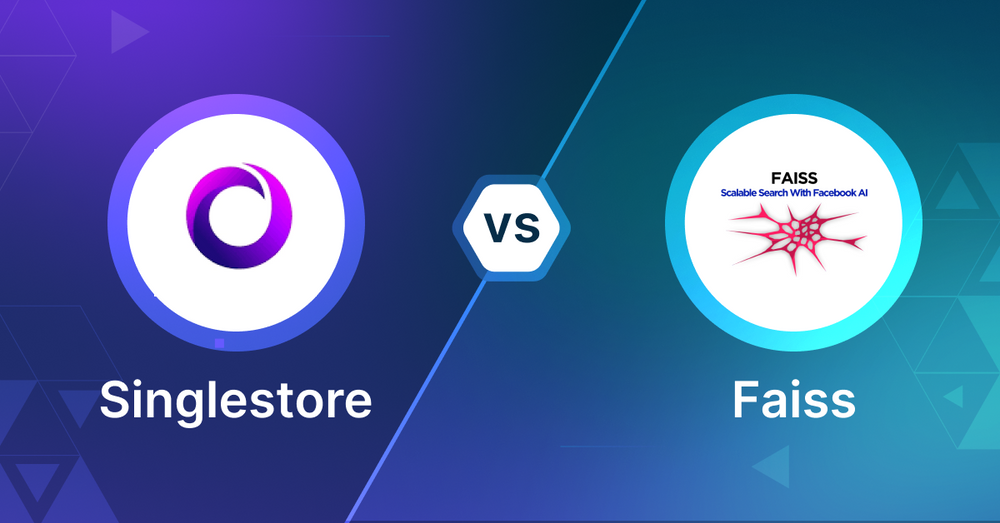SingleStore vs Faiss Choosing the Right Vector Database for Your AI Apps

What is a Vector Database?
Before we compare SingleStore and Faiss, let's first explore the concept of vector databases.
A vector database is specifically designed to store and query high-dimensional vectors, which are numerical representations of unstructured data. These vectors encode complex information, such as the semantic meaning of text, the visual features of images, or product attributes. By enabling efficient similarity searches, vector databases play a pivotal role in AI applications, allowing for more advanced data analysis and retrieval.
Common use cases for vector databases include e-commerce product recommendations, content discovery platforms, anomaly detection in cybersecurity, medical image analysis, and natural language processing (NLP) tasks. They also play a crucial role in Retrieval Augmented Generation (RAG), a technique that enhances the performance of large language models (LLMs) by providing external knowledge to reduce issues like AI hallucinations.
There are many types of vector databases available in the market, including:
- Purpose-built vector databases such as Milvus, Zilliz Cloud (fully managed Milvus)
- Vector search libraries such as Faiss and Annoy.
- Lightweight vector databases such as Chroma and Milvus Lite.
- Traditional databases with vector search add-ons capable of performing small-scale vector searches.
SingleStore is a distributed, relational, SQL database management system vector search as an add-on. Faiss are open-source, lightweight libraries built for efficient vector search. This post compares their vector search capabilities.
SingleStore: Overview and Core Technology
SingleStore has made vector search possible by putting it in the database itself, so you don’t need separate vector databases in your tech stack. Vectors can be stored in regular database tables and searched with standard SQL queries. For example, you can search similar product images while filtering by price range or explore document embeddings while limiting results to specific departments. The system supports both semantic search using FLAT, IVF_FLAT, IVF_PQ, IVF_PQFS, HNSW_FLAT, and HNSW_PQ for vector index and dot product and Euclidean distance for similarity matching. This is super useful for applications like recommendation systems, image recognition and AI chatbots where similarity matching is fast.
At its core SingleStore is built for performance and scale. The database distributes the data across multiple nodes so you can handle large scale vector data operations. As your data grows you can just add more nodes and you’re good to go. The query processor can combine vector search with SQL operations so you don’t need to make multiple separate queries. Unlike vector only databases SingleStore gives you these capabilities as part of a full database so you can build AI features without managing multiple systems or dealing with complex data transfers.
For vector indexing SingleStore has two options. The first is exact k-nearest neighbors (kNN) search which finds the exact set of k nearest neighbors for a query vector. But for very large datasets or high concurrency SingleStore also supports Approximate Nearest Neighbor (ANN) search using vector indexing. ANN search can find k near neighbors much faster than exact kNN search sometimes by orders of magnitude. There’s a trade off between speed and accuracy - ANN is faster but may not return the exact set of k nearest neighbors. For applications with billions of vectors that need interactive response times and don’t need absolute precision ANN search is the way to go.
The technical implementation of vector indices in SingleStore has specific requirements. These indices can only be created on columnstore tables and must be created on a single column that stores the vector data. The system currently supports Vector Type(dimensions[, F32]) format, F32 is the only supported element type. This structured approach makes SingleStore great for applications like semantic search using vectors from large language models, retrieval-augmented generation (RAG) for focused text generation and image matching based on vector embeddings. By combining these with traditional database features SingleStore allows developers to build complex AI applications using SQL syntax while maintaining performance and scale.
Faiss: Power and Flexibility for Large-Scale AI
Faiss (Facebook AI Similarity Search) is an open-source library developed by Meta (formerly Facebook) that provides highly efficient tools for fast similarity search and clustering of dense vectors. Faiss is designed for large-scale nearest-neighbor search and can handle both approximate and exact searches in high-dimensional vector spaces. Faiss is designed to handle enormous datasets and stands out for its ability to leverage GPU acceleration, providing a major boost in performance for large-scale applications. It is particularly well-suited for AI and machine learning applications.
Key Features of Faiss:
- Approximate and Exact K-Nearest-Neighbor Search (ANN & KNN): Faiss supports both approximate and exact nearest-neighbor (NN) searches. It allows you to trade off between speed and accuracy depending on your application's specific needs.
- GPU Acceleration: One of Faiss's standout features is its support for GPU acceleration. This allows it to scale effectively to large datasets and perform searches faster than CPU-only methods.
- Large Dataset Handling: Faiss is optimized for handling datasets that are too large to fit into memory. It uses various indexing techniques, such as inverted files and clustering, to organize data efficiently and perform searches on huge collections.
- Multiple Indexing Strategies: Faiss supports various methods for indexing vectors, such as flat (brute-force) indexing, product quantization, and hierarchical clustering. This provides flexibility in how searches are performed, depending on whether speed or accuracy is more important.
- Support for Distributed Systems: Faiss can perform searches across multiple machines in distributed systems, making it scalable for enterprise-level applications.
- Integration with Machine Learning Frameworks: Faiss integrates well with other machine learning frameworks, such as PyTorch and TensorFlow, making it easier to embed into AI workflows.
Key Differences
Search Methodology and Core Features
SingleStore integrates vector search directly into its SQL database engine. We support both exact k-nearest neighbors (kNN) and Approximate Nearest Neighbor (ANN) searches through various indexing methods (FLAT, IVF_FLAT, IVF_PQ, IVF_PQFS, HNSW_FLAT, HNSW_PQ). You can do similarity matching with dot product and Euclidean distance metrics so it’s good for many use cases.
Faiss, developed by Meta, takes a different approach as a specialized library for vector similarity search and clustering. It has both exact and ANN search capabilities with strong GPU acceleration. Since it’s specialized for high-dimensional vector spaces and large-scale AI applications where pure vector search is the only thing that matters.
Data Handling and Storage
SingleStore’s approach combines vector search with traditional database capabilities in a unique way. By storing vectors in regular database tables, you can combine vector searches with standard SQL and apply filters and constraints using regular database columns. This keeps data consistent with ACID and allows you to store both structured and vector data in one system.
Faiss approaches data handling with a vector focus. As a dedicated vector search library, it has efficient storage and retrieval of dense vectors through multiple indexing strategies. While this gives great vector search performance, it means you need separate storage solutions for non-vector data. This trade-off between specialization and breadth of functionality is something to consider for system architects.
Scalability and Performance
SingleStore scales through a distributed architecture that distributes data across multiple nodes. The system handles data distribution and query optimization for you, so you can add more nodes as your data grows. This is great for production environments that need to balance vector search with traditional database operations.
Faiss excels in pure vector search performance, especially with GPU acceleration. It can handle massive datasets through GPU-accelerated search and distributed search across multiple machines. It has memory-efficient operations and various compression techniques for large-scale deployments. It can harness GPU power which gives it a big advantage in compute-intensive vector operations.
Integration and Ecosystem
SingleStore’s SQL interface for vector operations makes it easy for teams already familiar with traditional databases. You can write standard SQL queries for vector operations and use built-in data management features. This eliminates the need for separate vector storage systems and allows you to interact seamlessly with existing SQL-based tools.
The Faiss ecosystem revolves around machine learning frameworks, it has native support for PyTorch and TensorFlow through its Python API. This is great for AI and machine learning teams. The library is flexible and can work with custom storage solutions and fit into various AI/ML pipelines but might require additional integration work.
Ease of Use and Implementation
SingleStore has a gentler learning curve for teams with SQL experience. The SQL syntax extends naturally to vector operations and you can use standard database monitoring and maintenance tools. Built-in data management features like backup and recovery reduces the operational overhead of managing vector search.
Implementing Faiss requires more specialized knowledge, you need to have good understanding of vector space operations and Python programming skills. Teams need to manage data manually and do custom integration work for production systems. But this complexity gives you more control over the implementation details.
Cost and Resource Considerations
SingleStore follows a commercial licensing model with infrastructure costs for the database cluster. This is a direct cost but the simplified stack reduces overall system complexity and operational costs by storing regular and vector data in one system.
Faiss being open-source has no licensing costs but organizations need to consider infrastructure costs for GPU resources, development time for integration and costs of additional storage systems. Maintaining multiple systems adds operational complexity but the performance benefits might outweigh these for specialized use cases.
Technical Requirements and Implementation
SingleStore has specific technical requirements, columnstore tables for vector indices and support for Vector Type(dimensions[, F32]) format. Implementation requires SQL knowledge and infrastructure for database deployment, but these requirements are already familiar to database operations.
For Faiss implementations you need a Python environment and optionally GPU support. The system requires custom storage implementation and integration work with existing systems. These technical requirements reflects Faiss’s focus on providing flexible high-performance vector search.
When to Choose SingleStore
SingleStore is the best choice for companies that need to combine traditional database operations with vector search in one system. It’s great for applications like e-commerce platforms, content recommendation systems and customer analytics where you need to do vector similarity search while maintaining relationships with structured data like user profiles, product info or transaction records. The SQL based approach is especially good for teams already working with relational databases who want to add AI without changing the underlying infrastructure.
When to Choose Faiss
Faiss is great for pure AI and machine learning environments where vector search performance is the only thing that matters. It’s perfect for research teams, computer vision applications, large scale similarity search engines and AI model development where GPU acceleration can give big benefits. Companies with dedicated ML engineering teams who need fine grained control over their vector search implementation and can handle the extra complexity of managing separate storage systems will find Faiss’s flexibility and performance very useful.
Conclusion
It’s SingleStore or Faiss, it depends on your technical requirements and organization. SingleStore is an integrated solution that combines SQL database with vector search, great for companies that need both traditional data operations and AI features. Faiss is specialized vector search with GPU acceleration and deep ML framework integration, perfect for AI only applications. Your choice should consider your existing tech stack, team expertise, performance requirements and whether you need a full database or a vector search only solution.
Read this to get an overview of SingleStore and Faiss but to evaluate these you need to evaluate based on your use case. One tool that can help with that is VectorDBBench, an open-source benchmarking tool for vector database comparison. In the end, thorough benchmarking with your own datasets and query patterns will be key to making a decision between these two powerful but different approaches to vector search in distributed database systems.
Using Open-source VectorDBBench to Evaluate and Compare Vector Databases on Your Own
VectorDBBench is an open-source benchmarking tool for users who need high-performance data storage and retrieval systems, especially vector databases. This tool allows users to test and compare different vector database systems like Milvus and Zilliz Cloud (the managed Milvus) using their own datasets and find the one that fits their use cases. With VectorDBBench, users can make decisions based on actual vector database performance rather than marketing claims or hearsay.
VectorDBBench is written in Python and licensed under the MIT open-source license, meaning anyone can freely use, modify, and distribute it. The tool is actively maintained by a community of developers committed to improving its features and performance.
Download VectorDBBench from its GitHub repository to reproduce our benchmark results or obtain performance results on your own datasets.
Take a quick look at the performance of mainstream vector databases on the VectorDBBench Leaderboard.
Read the following blogs to learn more about vector database evaluation.
Further Resources about VectorDB, GenAI, and ML
- What is a Vector Database?
- SingleStore: Overview and Core Technology
- Faiss: Power and Flexibility for Large-Scale AI
- Key Differences
- Search Methodology and Core Features
- Data Handling and Storage
- Scalability and Performance
- Integration and Ecosystem
- Ease of Use and Implementation
- Cost and Resource Considerations
- Technical Requirements and Implementation
- When to Choose SingleStore
- When to Choose Faiss
- Conclusion
- Using Open-source VectorDBBench to Evaluate and Compare Vector Databases on Your Own
- Further Resources about VectorDB, GenAI, and ML
Content
Start Free, Scale Easily
Try the fully-managed vector database built for your GenAI applications.
Try Zilliz Cloud for FreeKeep Reading

Why Context Engineering Is Becoming the Full Stack of AI Agents
Context engineering integrates knowledge, tools, and reasoning into AI agents—making them smarter, faster, and production-ready with Milvus.
Milvus/Zilliz + Surveillance: How Vector Databases Transform Multi-Camera Tracking
See how Milvus vector database enhances multi-camera tracking with similarity-based matching for better surveillance in retail, warehouses and transport hubs.

How AI Is Transforming Information Retrieval and What’s Next for You
This blog will summarize the monumental changes AI brought to Information Retrieval (IR) in 2024.
The Definitive Guide to Choosing a Vector Database
Overwhelmed by all the options? Learn key features to look for & how to evaluate with your own data. Choose with confidence.